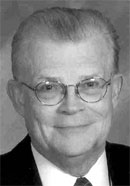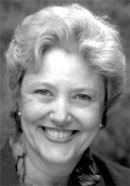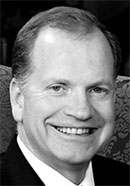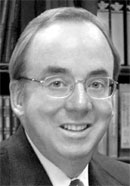| Q&A with UTA's oldest living graduate | Alumni as college presidents | Recognition of contributors |
 |
||
| Home Forethought Campus Buzz Feature Stories Re:Search The Score Alum News Yesteryear | ||
Jesse Rogers had it all figured out. He would enroll at UTA, go to work as an engineer and live happily ever after. And that’s almost how it happened.
|
|
|
Dr. JESSE W. ROGERS President, Midwestern State University Wichita Falls, Texas UTA Degree: B.S., chemistry, '63 |
He enrolled in engineering courses, but he loved organic chemistry more. So plans changed. He would go to work as a chemist and live happily ever after. And that’s almost how it happened.
Rogers earned his B.S. in 1963 and planned on a short-term appointment as a chemistry professor. He wanted enough money to rent a trailer. And that’s not what happened at all.
“I’ve been like a cork on a sea virtually all through my life,” he said. “I’ve never really been in a position to plan my life. It just sort of happened to me.”
What’s happened is this: Almost 40 years and a dozen job descriptions later, Dr. Rogers is president of Midwestern State University in Wichita Falls. He’s one of six known UTA alumni who currently lead a college or university. The others: Daniel Akin, Southeastern Baptist Theological Seminary in Wake Forest, N.C.; Joe Birmingham, Central Lakes College, with campuses in Brainerd and Staples, Minn.; Arthur Cleveland, Sheldon Jackson College in Sitka, Alaska; David Dockery, Union University, with campuses in Jackson and Germantown, Tenn.; and Elisabeth Muhlenfeld, Sweet Briar College in Sweet Briar, Va.
Two other alumni—R. Byron Pipes (Rensselaer Polytechnic Institute) and William Auvenshine (Hill College)—recently retired from such roles. And one current student, M.B.A. candidate Michael Resser, is president at Texas State Technical College-West Texas.
Like Rogers, who was recently named a Distinguished Alumnus, none of these administrators enrolled in college with presidential aspirations—most weren’t even pursuing careers in education—but they credit UTA for getting them where they are now.
|
|
|
Dr. ARTHUR G. CLEVELAND President, Sheldon Jackson College Sitka, Alaska UTA Degree: B.S., biology, '62 |
“UTA opened my eyes to a lot of things,” Dr. Cleveland said. “I think a big part of it was the closeness I felt to several of the professors. They were really role models for me in terms of research and excellence in education. Because of them, I wanted to go on. … I also learned a great deal, particularly in leadership, through the ROTC.”
Cleveland, who completed his B.S. in 1962, is a member of UTA’s Military Science Hall of Honor and was among the fabled Fort Hood marchers (see winter 2004 issue). He is a former Army doctor who has spent 38 years in education, mostly as a dean or professor working under seven presidents at four universities. “Each of them had different qualities, and I watched those,” he said. “Without knowing it, for a long time I was envious of them.”
Cleveland followed their lead, beginning his first presidential job in August. He said he’d like to spend seven or eight years in “one of the most beautiful places in the world,” Sitka, Alaska.
“I’m enjoying it, being able to see things happen and to have an opportunity to work with a great diversity of students,” he said. “It’s just very rewarding to work with them and see progress in the school.”
|
|
|
Dr. JOE C. BIRMINGHAM President, Central Lakes College with campuses in Brainerd and Staples, Minn. UTA Degree: B.S., biology, '69 |
Dr. Birmingham earned his biology degree seven years after Cleveland, in 1969, and started down the road to dental school. But for him, pulling teeth was like, well, pulling teeth.
“I saw that wasn’t my place.”
Instead, he taught biology at Carter High School in Dallas. During the next 28 years, he would teach chemistry at El Centro College, direct a grant program at the University of North Texas and serve as a vice president at Yavapai College in Arizona. Nine years ago, he became president of LaBette Community College in Kansas before moving to his current appointment in 2000.
Through all the moves, UTA, he says, was never far from his mind.
“I still think nostalgically at times about some of those very challenging biology classes I had at UTA. It was very rigorous. The competition among students was fierce [because] we all wanted to get into medical school and dental school. I really got a solid background in what it means to study hard and achieve.”
|
|
|
Dr. ELISABETH S. MUHLENFELD President, Sweet Briar College Sweet Briar, Va. UTA Degree: M.A., English, '73 |
Dr. Muhlenfeld knows something herself about achievement. She was the mother of a toddler and a newborn when she received her master’s degree in English from UTA in 1973. She then earned a Ph.D., became a dean at Florida State University and has led one of the nation’s top-ranked liberal arts colleges, Sweet Briar, since 1996.
“I love teaching, research and writing, but administration is even more intriguing,” she said. “In the classroom you can affect the students you teach directly, but if one has a significant role in a college or university, one can make a positive difference on a whole institution. … I feel privileged to develop a career doing something that matters greatly.”
The way she sees it, she’s carrying the torch of her own professors. Muhlenfeld, who has authored four books, said UTA faculty taught her to “think for myself as a professional, forging a career.”
|
|
|
Dr. DANIEL L. AKIN President, Southeastern Baptist Theological Seminary Wake Forest, N.C. UTA Degree: Ph.D., history, '89 |
Dr. Akin has had a helping hand, too. He was “as happy as I could be” as a dean at Southern Seminary in Kentucky and had no plans to leave. In fact, he told members of the search committee from Southeastern Baptist that he wasn’t interested in their presidency. But he believes God had other ideas.
“I came to realize I should talk to them,” he said. Two months later, in January 2004, he began his current role there. He also taught at Dallas’ Criswell College while pursuing his Ph.D. at UTA in 1989, all the while planning to be a pastor. But his true calling was education, and today he leads one of the world’s five largest seminaries.
“The Lord was leading me in that direction,” he said. “This was never on my radar. But I’m genuinely honored and humbled by it. And I’m having a great time.”
Akin had a penchant for academics, even publishing his graduate research. He did so only one year after Dockery, his close friend.
|
|
|
Dr. DAVID S. DOCKERY President, Union University with campuses in Jackson and Germantown,Tenn. UTA Degree: Ph.D., humanities, '88 |
In his nine years as president, Dr. Dockery has increased Union University’s enrollment by two-thirds, including two of Akin’s sons. Union has been called the most influential evangelical college in the South. And that’s Dockery’s mission.
“The opportunity to cast an institution-wide vision and serve students in their education preparation … led me in this direction,” he said. “The privilege to lead an institution and to help shape the future of that institution and the students associated with it, recognizing the incredible opportunities that they will have to influence the world for good, is a very exciting thing to think about.”
Rogers can relate.
He has stayed at Midwestern State since 1967 because he can’t imagine himself anywhere else. “I had second thoughts about whether I should have made this turn. I know that I should. I couldn’t give it up now. … I recently turned down a couple of jobs because I’ve started so many projects, and I wouldn’t dare leave them for somebody else to clean up.”
In other words, he has much left to do. And he’ll draw upon his past in planning his future.
“Everything that I’ve been able to accomplish really started at UTA,” he said. “I really found out what hard work meant at UTA, how important precision is in what you do and the level you have to work at to succeed in the world. I never had a professor who didn’t push me. It changed my life. I grew up there; I gained a lot of confidence there. I worked hard—really hard—and learned what it took to succeed.”
Five of his fellow alumni are sharing that same success.
— Danny Woodward
| Archives
| Alumni Association |
Giving to UTA | UTA
Home Copyright © 2005 UTA Magazine. All rights reserved. |





